- Home
- John le Carré
Single & Single Page 9
Single & Single Read online
Page 9
“Nowhere I’d like to go again, thank you, Bernard,” he said primly.
This was how they always spoke: as if their mutual aggression were a sparring game, whereas on Brock’s side it was a deadly earnest duel that only one of them could win.
“So what’s on our mind, Bernard?” Brock asked. “Some people sleep at night, I’m told.”
“Who killed Alfred Winser, then?” Porlock demanded coaxingly, through the same long grin.
Brock affected to search his memory. “Winser. Alfred. Ah, yes. Well, it wasn’t the common cold that killed him, was it, not according to the papers. I’d have thought you boys would be out there by now, come to think of it, frustrating the locals in their inquiries.”
“So why aren’t we, Nat? Why does nobody love us anymore?”
“Bernard, I am not paid to justify the comings and goings of the distinguished gentlefolk of Scotland Yard.” He was still seeing the taunting smile, talking at it. One day, if I live long enough, I’ll be talking at it through the bars, I swear.
“Why are those fairies in the Foreign Office insisting I wait and see the Turkish police report before forcing my nasty attentions on them? There’s somebody’s hand at work and I’ve a good idea it’s yours, when it isn’t busy elsewhere,” said Porlock.
“Now you’ve shocked me, Bernard. Why would a mere downtrodden Customs officer two years off retirement seek to interfere with the wheels of justice?”
“You chase money launderers, don’t you? Everyone knows Single’s are laundering money for the Wild East. They’re practically listed in the Yellow Pages.”
“So how does that lead us to the random murder of Mr. Alfred Winser, Bernard? You’re losing me on the causality, I’m afraid.”
“Winser’s a related case, isn’t he? If you can find out who killed Alfred Winser, maybe you can nail Tiger. I can see that one playing with our Whitehall masters, specially when accompanied by a nice brown nose.” He affected an offensively posh accent, and rendered it with a homophobe lisp. “ ‘Let old Net handle this one. This one is raight up old Net’s street.’”
Brock allowed himself a pause for prayer and contemplation. I’m watching it in action, he thought. It’s happening to me here and now. Porlock is coming to the protection of his paymaster, and he’s doing it under the arc lights. Get back to the shadows, he thought. If you’re a crook, act like a crook, and don’t sit next to me at weekly meetings. “I don’t chase launderers, Bernard, you see,” Brock explained. “I’ve learned my lesson on that one. I chase their money. There was one I chased, long ago, it’s true,” he reminisced in a caricature of his Liverpool twang. “Put a lot of very expensive lawyers and accountants onto him, turned him inside out. Five years and several million quid of public money later he gave me two fingers in open court and walked out a free man. I’m told the jury are still trying to read the long words. So, good night to you, Bernard, and many of them.”
But Porlock had not quite done with him.
“Here. Nat.”
“What is it?”
“Let your hair down. Little club I know in Pimlico. Very friendly people, not all of the male gender. On me.”
Brock nearly laughed out loud. “You’ve got this one a bit wrong, haven’t you, Bernard?”
“Why’s that, then?”
“Policemen are supposed to be bribed by crooks. They don’t go bribing one another, not where I come from.”
Released, Brock unlocked a formidable wall safe and drew out a hardbacked, quarto-sized, ruled diary labeled HYDRA in his own hand, opened it at the day’s date and wrote as follows in his painstaking courtroom copperplate:
0122 hrs, unsolicited incoming call from D/Supt Bernard Porlock seeking information regarding the state of investigation into the murder of A. Winser. Taped conversation terminated 0127 hrs.
And having filled in the rest of his claim form, he rang his wife, Lily, at home in Tonbridge, although it was by now two in the morning, and let her regale him with stories of dark doings in the local Women’s Institute, which she confided in a breathless torrent.
“And that Mrs. Simpson, Nat, she marches straight up to the jams table and she picks up Mary Ryder’s jar of marmalade and she smashes it on the floor. Then she turns round to Mary and she says, ‘Mary Ryder, if your Herbert ever stands outside my bathroom window again at eleven o’clock at night with his nasty nature in his hand, I’ll set the dog on him and you’ll both be sorry.’”
He didn’t say where he’d been these last days, and Lily didn’t ask. Sometimes the secrecy saddened her, but more often it was like a shared and precious bond of service. Next morning prompt at eight-thirty, Brock and Aiden Bell headed southward in a cab across the river. Bell was a graceful figure with a seeming courtliness that women trusted at their peril. He sported a military-looking suit of green tweed.
“Had an invitation from a bald St. Bernard last night,” Brock informed him, in the short-range murmur with which he reluctantly imparted secrets. “Wants me to go with him to a dirty club he knows in Pimlico so that he can take compromising photographs of me.”
“Nothing if not subtle, our Bernard,” said Bell grimly, and there was a shared moment while they pooled their indignation. “One day,” said Bell.
“One day,” Brock agreed.
Neither Bell nor Brock was any longer what he seemed. Bell was a soldier and Brock, as he had reminded Bernard Porlock, a humble Customs man. Yet both had been assigned to the joint team, and both were aware that the first purpose of the team was to close artificial gaps between departments. Each second Saturday of the month any member not engaged elsewhere was invited to attend these informal prayer sessions held in a glum box-shaped building beside the Thames. The speaker today was a wise woman from Research who treated them to the latest doomsday tally of international crime:
—this many kilos of ex-Soviet weapons-grade nuclear materials sold under the counter to this or that Middle Eastern maverick
—this many thousands of machine guns, automatic rifles, night vision glasses, land mines, cluster bombs, missiles, tanks and artillery pieces dumped by means of spurious end-user certificates on the newest terror-friendly African despot or narcotyrant
—this many billions of drug money spirited into the socalled white economy
—this many tons of refined heroin shipped via Spain and northern Cyprus to the following European ports
—this many tons reaching the British wholesale market in the last twelve weeks, street value this many hundreds of millions; this many kilos impounded, amounting to an estimated .0001 percent of gross
Illegal narcotics, she said sweetly, now accounted for one-tenth of all world trade.
Americans spent seventy-eight billion dollars a year on their drug habit.
World production of cocaine had doubled in the last ten years, heroin had tripled. The industry turned over four hundred billion dollars annually.
South America’s military elite now made drugs, not war. Countries unable to grow their own crops were offering chemical refineries and sophisticated forms of transportation as a means of getting a toehold in the business.
Uninvolved governments were in a quandary. Should they frustrate the success of the black economy—assuming they were able—or share in its prosperity?
In dictatorships, where public opinion was irrelevant, the answer was obvious.
In democracies a double standard existed: those who preached zero tolerance were giving a free license to the black economy, while those who preached decriminalization were offering it safe conduct—which was the wise woman’s cue to tiptoe into the Hydra’s lair.
“Crime no longer exists in isolation of the state, if it ever did,” she declared, with the firmness of a headmistress lecturing her school leavers. “Today’s stakes are too big for crime to be left to the criminals. We are no longer looking at adventurous outlaws who will reveal themselves by clumsiness or repetition. When one containerload of cocaine safely landed at a British port is w
orth a hundred million pounds, and the harbormaster is enjoying a salary of forty thousand, we are looking at ourselves. At the harbormaster’s ability to resist temptation on an unprecedented scale. At the harbormaster’s superior. At the dockside police. At their superiors. At Customs. And theirs. At the enforcers, bankers, lawyers and administrators who look the other way. To imagine that these people can synchronize their collaborative efforts without a central command and control system, and the active connivance from others in high positions, is absurd. That’s where the Hydra comes in.”
A pop from somewhere as the inevitable visual aid was flashed onto the screen behind her, showing the anatomy of the British body politic laid out like a family tree. Strewn across it were the Hydra’s many heads and, in gold, the ley lines that connected them. Instinctively Brock’s eye selected the Metropolitan Police, where the bald silhouette of Porlock like an arrogant Roman medallion presided, and the gold lines spewed out of him like fountains of munificence. Born Cardiff in 1948, Brock rehearsed: 1970, joined West Midlands Regional Crime Squad, reprimanded for excessive zeal in the performance of his duties, i.e., faking evidence. Sick leave, promoted on transfer. In 1978, joined Liverpool Docks Police, secured spectacular conviction of useless drugs gang that was unwisely competing with established rival. Three days after trial ended, took all-expenses-paid holiday in southern Spain with leaders of said rival gang. Claimed he was gathering essential criminal intelligence, exonerated, transferred on promotion. In 1985, investigated for allegedly accepting inducements from identified leader of a Belgian drugs syndicate. Exonerated, commended, promoted on transfer. In 1992, featured in British tabloid press lunching with two members of an illegal Serbian arms procurement team at a girlie restaurant in Birmingham. Caption: “PORLOCK THE WARLOCK! Whose side are you on, Superintendent?” Awarded fifty thousand pounds libel damages, exonerated by internal inquiry, promoted on transfer. How do you face yourself in the shaving mirror every morning? Brock asked him in his mind. Answer, easily. How do you sleep at night? Answer, excellently. Answer, I have a Teflon hide and the conscience of the dead. Answer, I burn files, terrify witnesses, buy allies, walk tall.
The meeting ended, as such meetings were wont to do, in a mood of jocular despair. On the one hand the troops were heartened: anything went, nothing was too much in the war against human wickedness. But they also knew that, if they lived to be a thousand and all their efforts were successful, they would inflict at best a few flesh wounds on the eternal enemy. Oliver and Brock sat on deck chairs in the back garden of the Camden House under a brightly colored parasol. A tray of tea and biscuits lay before them on a table. Nice china, proper tea, no tea bags, low spring sun.
“Tea bags are made of dust,” said Brock, who had his little fads. “If you want a decent cup of tea, you’ve to go for the leaves, not dust.”
Oliver squatted in the parasol’s shade. He was wearing what he had traveled in: jeans, chukka boots and a sloppy blue anorak. Brock sported a silly straw hat that the crew had bought him in Camden Lock that morning for a joke. Oliver had no quarrel with Brock. Brock had not invented, seduced, bribed or blackmailed him. Brock had committed no sin against Oliver’s soul that had not been committed long ago. It was Oliver, not Brock, who had rubbed the lamp, and it was Brock who had materialized in obedience to Oliver’s command:
It is midwinter and Oliver is a little mad. That much he knows about himself, no more. The origins of his madness, its causes, duration and degree, are not within his grasp, not now. They are out there, but for another time, another life, another couple of brandies. The neon-lit gloom of a December’s night at Heathrow airport reminds him of a boys’ changing room in one of his many boarding schools. Garish cardboard reindeer and taped carols compound his mood of unreality. Snowy lettering dangles from a washing line, wishing him peace and joy on earth. Something amazing is about to happen to him and he is eager to find out what it will be. He isn’t drunk but technically he isn’t sober either. A few vodkas on the flight, a half of red with the rubber chicken, a Rémy or two afterward have done no more in Oliver’s eyes than bring him up to speed with the furor already raging inside him. He has only hand luggage and nothing to declare except a reckless ferment of the brain, a firestorm of outrage and exasperation starting so long ago that its origins are impossible to peg, blowing through his head like a hurricane while other members of his internal congregation stand around in timid twos and threes and ask one another what on earth Oliver is going to do to put it out. He is approaching signs of different colors and, instead of wishing him peace, joy on earth and goodwill among men, they are requiring him to define himself. Is he a stranger in his own country? Answer, yes he is. Has he arrived here from another planet? Answer, yes he has. Is he blue? Red? Green? His eye drifts to a tomato-colored telephone. It is familiar to him. Perhaps he noticed it on his way out three days ago and, unknown to himself, recruited it as a secret ally. Is it heavy, hot, alive? A notice beside it reads: “If you wish to speak to a Customs officer, use this phone.” He uses it. That is to say, his arm reaches out for it unbidden, his hand grasps it and puts it to his ear, leaving him with the responsibility of what to say. The telephone is inhabited by a woman, and he has not expected a woman. He hears her saying, “Yes?” at least twice, then, “Can I help you, sir?” which suggests to him that she can see him though he cannot see her. Is she beautiful, young, old, stern? Never mind. With the courtesy that is innate in him he replies that, well, yes, actually she could help him, he would like please to speak privately to someone in authority on a confidential matter. When he hears his own voice in the earpiece, its composure amazes him. I am in command of myself, he thinks. And with the detachment from his terrestrial self now absolute, he is overwhelmingly grateful to be in the hands of someone so capable. Your problem is that if you don’t act now you never will, the assured voice of his terrestrial self explains to him. You’ll go under, you’ll drown, it’s now or never, one hates to be dramatic but there comes a time. And perhaps his terrestrial self actually says some of this live into the red telephone, because he senses the alien woman stiffen and pick her words with deliberation.
“Remain exactly where you are by the telephone, please, sir. Don’t move. An officer will be with you in one moment.”
And here Oliver has an extraneous memory of a telephone bar in Warsaw where you rang girls at other tables and the girls rang you—which was how he had found himself buying a beer for a six-foot schoolteacher named Alicja who warned him that she never slept with Germans. This evening, however, he draws a small athletic-looking woman with a boy’s haircut and a white shirt with epaulettes. Is she the same artful woman who called him “sir” before he spoke? He cannot tell but knows that she is scared of his size and wondering whether he is a nutter. Standing back from him she takes in his expensive suit and briefcase and gold cuff links and handmade shoes and red-hot face. She ventures a step closer and staring straight up at him with her jaw out she asks his name and where he has arrived from, and mentally Breathalyzes his answers. She asks for his passport. He slams his pockets, can’t find it as usual, locates it, delves for it, nearly buckles it in his anxiety to please and hands it to her.
“It’s got to be someone high up,” he warns her but she is too busy turning the pages.
“This is your only passport, is it?”
Yes, it is, his terrestrial self retorts loftily. And nearly adds, “my good woman.”
“You’re not dual nationality or anything, then, are you?” No, I’m not.
“So this is the passport you’re traveling on, is it?”—turning another page.
Yes.
“Georgia, Russia?” Yes.
“And that’s where you’ve just arrived from, is it? Tbilisi?”
No. Istanbul.
“And was it something about Istanbul you were wanting to talk about? Or Georgia?”
I wish to speak to a senior officer, Oliver repeats. They traverse a corridor crammed with frightened Asians seated on sui
tcases. They enter a windowless interviewing room with a table screwed to the floor and a mirror screwed to the wall. In his self-induced trance Oliver sits unbidden to the table and marvels at himself in the mirror.
“So I’m going to find someone for you, right?” she says severely. “I’m going to keep your passport and you’ll get it back later, right? Somebody will come as soon as they can. Right?”
Right. Everything absolutely right as rain. Half an hour passes, the door opens, but instead of a full admiral dripping with gold braid, a scrawny blond boy in white shirt and uniform trousers appears bearing a cup of sweet tea and two sugary biscuits.
“Sorry about this, sir. It’s the season, I’m afraid. Everybody going everywhere for Christmas. An appropriate officer is on his way to you. You asked for somebody senior, I believe.”
Yes, I did. The boy stands himself behind Oliver’s shoulder, watching him drink his tea.
“Nothing like a nice cuppa when we get back to the old country, is there?” he says to Oliver’s reflection in the mirror. “Got a home address at all, sir?”
Oliver spells out his glitzy Chelsea address while the boy writes it in a notebook.
“How long you been in Istanbul, then?”
Couple of nights.
“That was long enough, was it, for what you had to do?”
Quite long enough.
“Pleasure or business?”
Business.
“Been there before?”
A few times.
“Always visit the same people, do you, when you go to Istanbul?” Pretty much.
“Travel a lot, do you, in your line of work?”
Too much, sometimes.
“Gets you down, does it?”
It can do. Depends. Oliver’s terrestrial self is becoming bored and apprehensive. Wrong time, wrong place, he is telling himself. Nice idea but a bit over the top. Ask for passport back, taxi home, large nightcap, bite the bullet, get on with life.

 The Honorable Schoolboy
The Honorable Schoolboy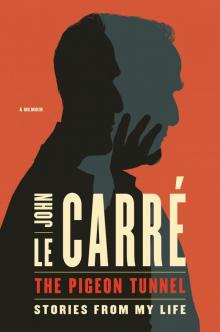 The Pigeon Tunnel: Stories From My Life
The Pigeon Tunnel: Stories From My Life Single & Single
Single & Single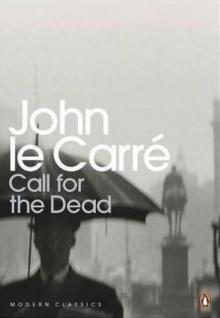 The Spy Who Came in From the Cold
The Spy Who Came in From the Cold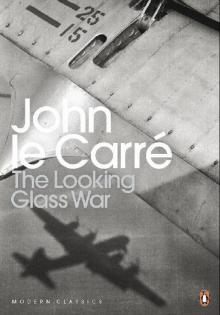 The Looking Glass War
The Looking Glass War The Night Manager
The Night Manager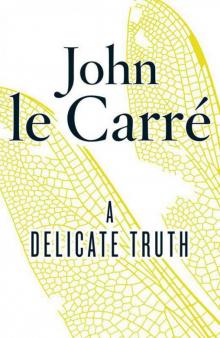 A Delicate Truth
A Delicate Truth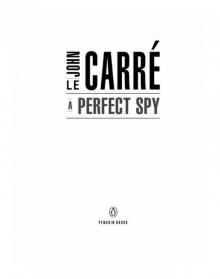 A Perfect Spy
A Perfect Spy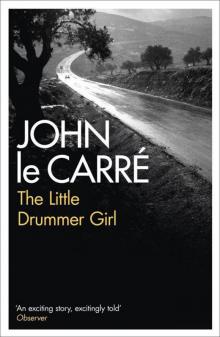 The Little Drummer Girl
The Little Drummer Girl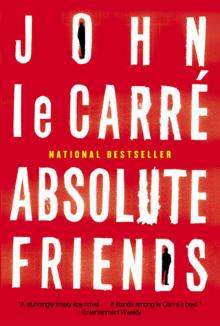 Absolute Friends
Absolute Friends A Murder of Quality AND Call for the Dead
A Murder of Quality AND Call for the Dead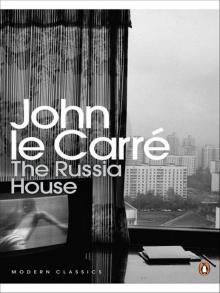 The Russia House
The Russia House The Tailor of Panama
The Tailor of Panama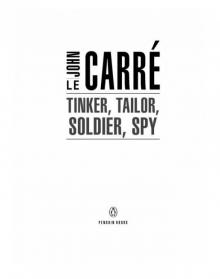 Tinker, Tailor, Soldier, Spy
Tinker, Tailor, Soldier, Spy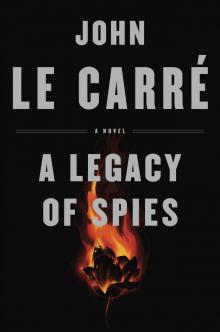 A Legacy of Spies
A Legacy of Spies The Mission Song
The Mission Song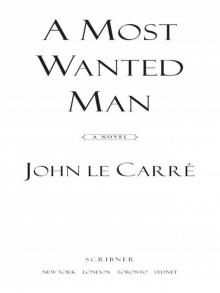 A Most Wanted Man
A Most Wanted Man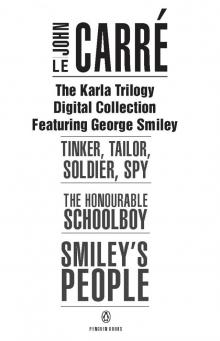 John Le Carré: Three Complete Novels
John Le Carré: Three Complete Novels The Secret Pilgrim
The Secret Pilgrim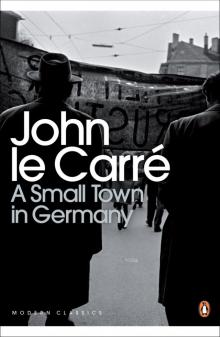 A Small Town in Germany
A Small Town in Germany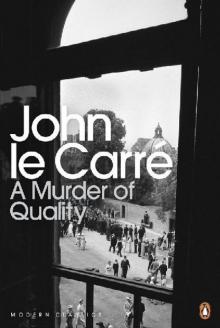 A Murder of Quality
A Murder of Quality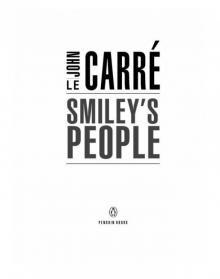 Smiley's People
Smiley's People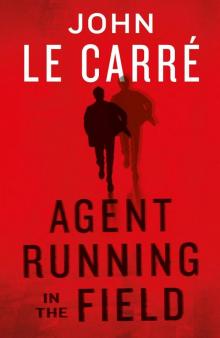 Agent Running in the Field
Agent Running in the Field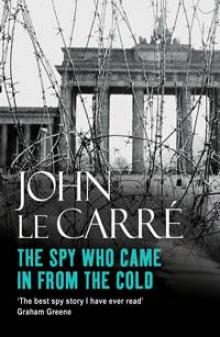 The Spy Who Came in from the Cold s-3
The Spy Who Came in from the Cold s-3 The Pigeon Tunnel
The Pigeon Tunnel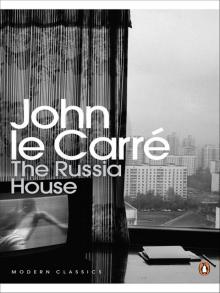 The Russia House - 13
The Russia House - 13 The Honourable Schoolboy
The Honourable Schoolboy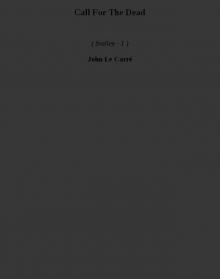 Call For The Dead s-1
Call For The Dead s-1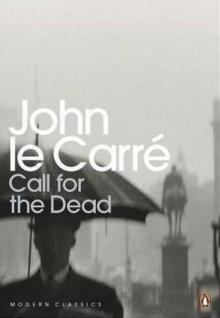 Call for the Dead
Call for the Dead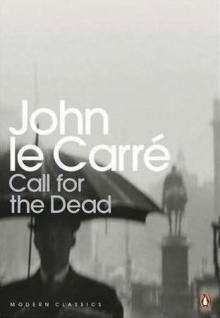 Call for the Dead - 1
Call for the Dead - 1